A to Z Keyword Research Guide For Small Businesses - 2022
- Dheeraj Soni
- 20 mins read
In one of my articles on this website, I talked about the Benefits of SEO for Small Businesses and why you must have your business online.
If you’re a business owner getting into your business online, then you must read that article. Now taking the same topic more ahead and advanced, today I will be presenting you the keyword research guide for small businesses.
Keyword research is one of the most crucial part of Search engine optimization. It’s not wrong saying that the success of your online business could be decided by the keywords you find.
If you can’t find good keywords, you can’t be a good SEO! And If you’re new to this and don’t even know a single thing, then this Keyword Research Guide For Small Business is for you!
In this keyword research guide, I will be telling you how to find easy to rank and profitable keywords for your business and generate customers.
The steps in this guide are the steps which I personally follow and keep in mind during my keyword research and getting good output as well and that’s why I’m sharing them here on my blog.
So let’s dive in with the Keyword Research Guide For Small Business.
1. What is Keyword Research and Why It’s Crucial?
2. Brainstorming – Make a List of Keywords
3. Broaden the Keyword List Using Tools
3.1 Google Keyword Planner
3.2 Google Search Console Queries
3.3 Google Search Suggestions and Related Searches
3.3 People Also Ask For
3.3 Keyword Research Extensions
3.4 Paid Tools
4. Cutting Down The Keyword List – My Strategy
4.1 Type of keywords
4.2 Focus on Long-Tail Keywords
4.3 Check Competition Manually
4.4 Add Location in the keyword
4.5 Check Search Volume
4.6 Have Patience and Let SEO perform itself
5 FAQS on Keyword Research For Small Businesses
6 Wrapping Up
What is Keyword Research and Why It's Crucial?
First of all let’s know what keywords are for those who are completely new in SEO.
Well, Keywords are nothing but the term or the word which is searched by a user in the Google Search or in any of the Search Engines and estimatedly there are 5.6 Billions of searches are made on google EVERYDAY, just think how big you can make from those searches.
It’s not wrong saying Keyword research is the toughest part of SEO, However, it would be worth it when it starts traffic rolling in.
How could people even know about your online presence if you’re not running Paid Advertisement Campaigns? Answer is SEO and Keyword Research.
If you can’t find good and profitable keywords you can’t rank on Google, and if you can’t rank people will not get aware about your business and ultimately you’re not going to make any profit plus you will waste your time too.
So these are keywords and Finding perfect keywords which can help us make a profit is called Keyword Research.
Now let’s dive into the process of finding the best and profitable keywords for small businesses.
Brainstorming - Make a List of Keywords
The very first step of keyword research for small business is to think and Brainstorm every possible keyword in your Industry that people could search.
Place yourself in the user’s place and you will be able to get the best keyword ideas in your mind. Now just make a list of all the keywords you have got because these keywords are going to help us in getting even more profitable keywords.
Broaden the Keyword List Using Tools.
After making a list of our primary keywords, now we’re going to make the list more broad and more specified.
For this we are going to use several tools to dig our list deeper and find more targeted and profitable keywords for small businesses which are low competitive as well, and ultimately will help you to rank even faster on Google.
To be very honest there are lots of Keyword Research Tools available out there but for now we are going to start with a free tool called Google Keyword Planner. If you have some money to invest then you can definitely with paid keyword research tools; Semrush is recommended.
I had also talked about some of the Best Chrome Extensions For Keyword Research. You may read it to find even more appealing and profitable keywords.
1. Google Keyword Planner
The best part is that it’s Google’s own tool and it’s completely free. However it’s made for the PPC keyword research for those who use to advertise their business through Google Ads, but it could be used for generating tons of keyword ideas as well.
For generating more keywords from your list, Login to the Google keyword planner tool using your gmail account that’s the first step 🙂
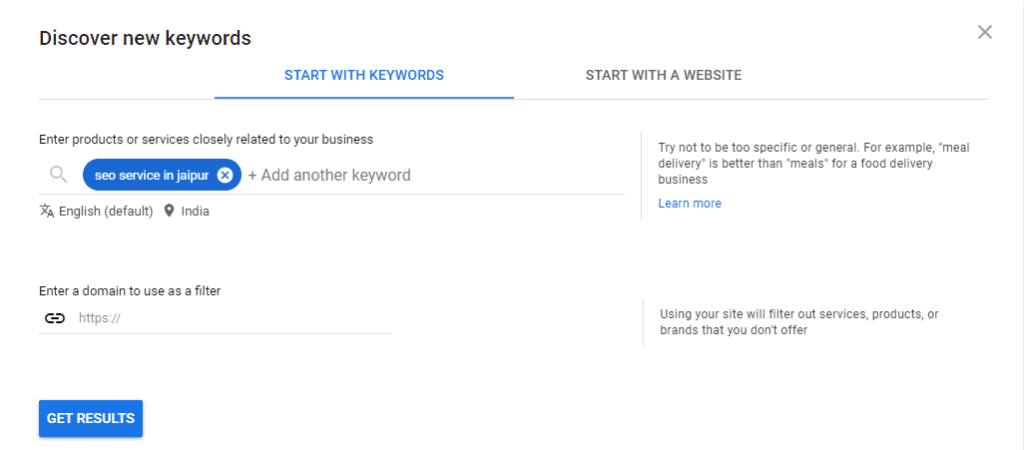
Now enter the keywords from the list that you have made while brainstorming. You can add some filters as well and the best part is you can choose a specific location if you have your business offline.
Now search the keywords and you can see a great list of keywords that are searched in Google with all their metrics.
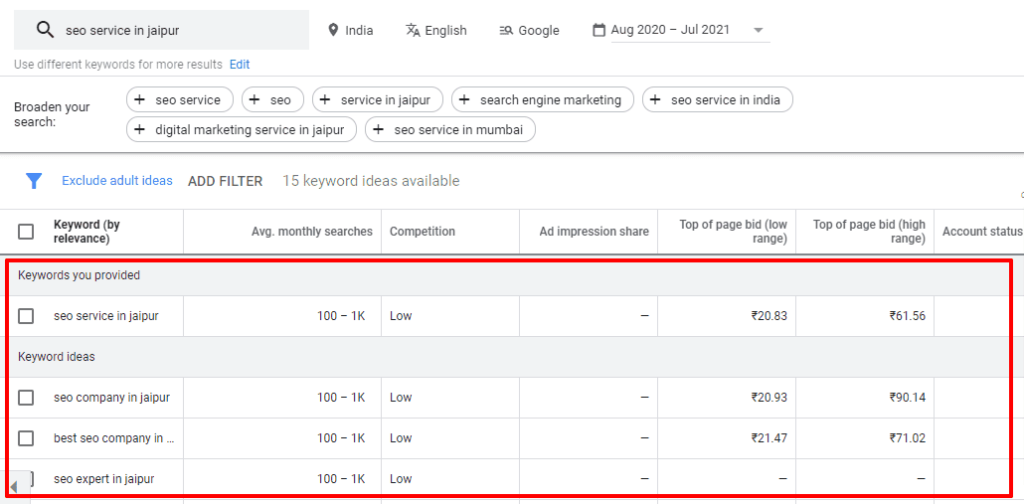
Now, the metrics shown in the list like Average Monthly Searches, Ads, Competition, Impression Share etc aren’t all necessary for us, because here the competition is for the advertisers not for the publishers.
The only thing that could be helpful to us is the Average Monthly Searches that’s it! To get even more accurate keyword metrics we aren’t going to use the same tool. Because the thing is that we are not going to use only one tool (or you can use paid tools either) but we are going to merge different tools and their specific features to get out the best profitable keywords.
So this is how you can easily generate and broaden your keywords list with the help of Google Keyword Planner tool.
2. Google Search Console Queries
Google Search Console is also one of the tools from which you can get an extended list of the keywords you have already worked on or posted an article on your website.
If you haven’t already submitted your website to Google Search Console, first if all do it!
Now, if you go to the Performance Tab right on the sidebar, You can see your entire organic traffic details like Impressions, Clicks you got on your articles and the CTR as well which is nothing but the Click Through Rate of your pages according to the impression they got.
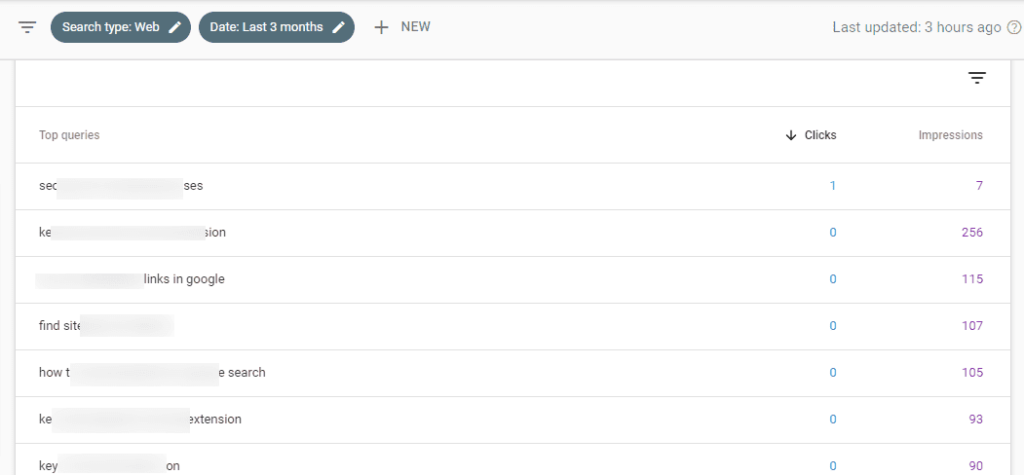
Just below the performance graph, There is an option named *Queries* where you can get every of your keywords on which your blog is ranked (even on the last page).
This could be an extended keyword list which you can use to improve your already published articles and better their On Page SEO score.
Here, You can only get keywords If you have already published some articles which are visible in the Google Search, Even on the last page but it must be visible in Google search.
3. Google Search Suggestions and Related Searches
You might have seen that Google keeps suggesting keywords when you type something in the search bar.
And those suggestions are the keywords which have good search volume and this technique is one of the best ways to get good keywords using one keyword.
What you can do is; Just enter your keyword in the Search bar and you will get some really good suggestions from Google of those keywords which are searched by its users often and have a good search volume as well.
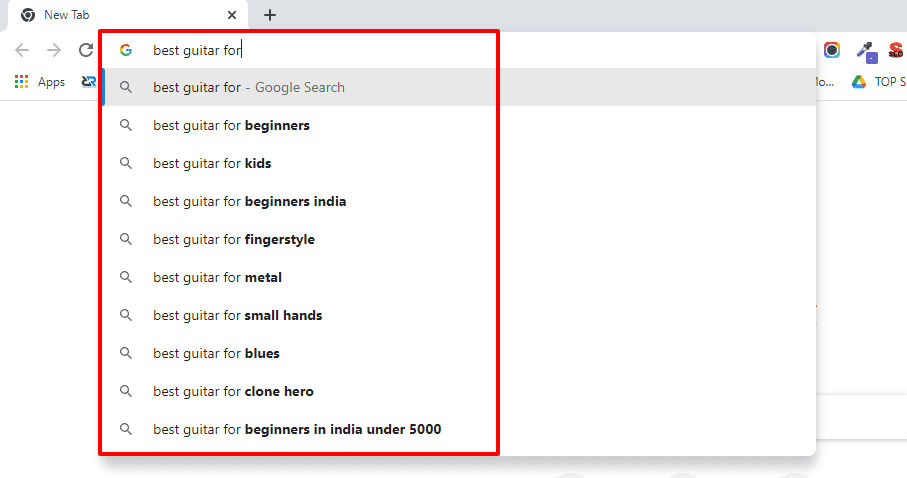
For example, Im putting Best Guitar For as a keyword and google has already suggested some good keywords and they seems to be business getter keywords as well as those who are planning to purchase the guitar can search this keyword and If I rank this keyword anyhow, The chances of getting me sales are way higher.
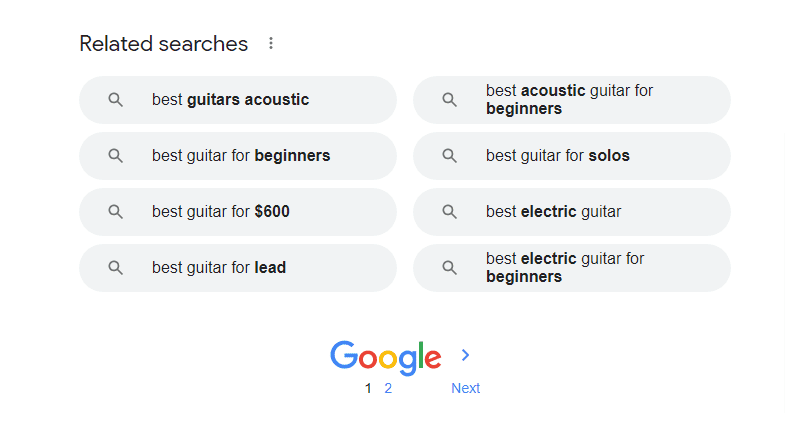
Additionally to this, When you scroll down to the SERPs you can also see a tab of Related Searches as well in the down side, Here you can get all the related keywords to the keyword that you’ve searched.
Again, these are the keywords which are being searched by the people often and have good search volume as well.
4. People Also Ask For
Google itself is a best Keyword miner tool as it will tell you the best keywords that others are searching in your industry and could be the best keywords for you as well.
Just like Google related searches, Google has one more tab too in the SERPs that’s called “People Also Asks For”.
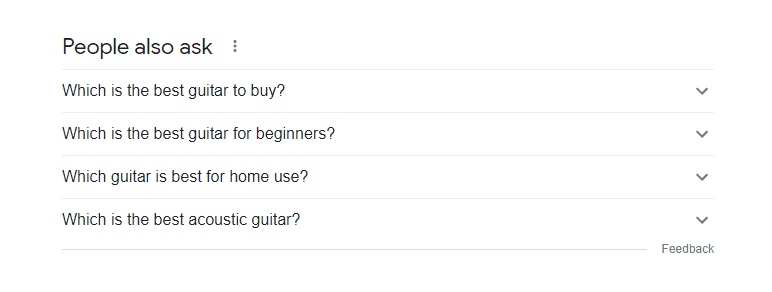
If you search your keyword on Google, you can see that tab easily where you can get some keywords which are different from the suggestion and related keywords that means you’re getting unique keywords that are making your keyword list broader.
The keywords that you will find from this tab are the question based keywords which you can use for adding FAQs sections in your articles and making them more SEO friendly.
By using Google’s amazing feature, you can get more keyword ideas and expand your keywords list faster.
5. Keyword Research Extensions
Another way of finding and broadening your keywords list is to use different keyword research extensions.
Extensions are nothing but a kind of application that can be installed in your browser.
I had already published a detailed article on Best keyword research chrome extensions in which I presented some of the best and free keyword research chrome extensions for making your keyword research process even easier.
With the help of keyword extensions, you can get your keyword list bigger and it will also show different metrics like the search volume for the keyword, it’s CPC and it’s competition as well.
So you can check my article on best keyword research chrome extensions for getting more detailed information about the same.
6. Paid Tools
If you have some money to invest, you can definitely go with paid keyword research tools.
You can go with tools like Ahrefs or Semrush for making your keyword research even easier and faster, Because you can get each and every information and metrics of the keywords at the same place as you’re getting charged.
One tip here: Semrush is comparatively more reliable and better when it comes to keyword research, However Ahrefs has its own benefits when it comes to Backlink analysis and Content analysis. So better to go with Semrush if your purpose is only keyword research.
Advance Learning
Cutting Down The Keyword List - My Strategy
Now let’s talk about my strategy for cutting down the list that we’ve made and filter out the most logical and profitable keywords that we can work on and rank as well.
Before this, I have already published an awesome article on SEO Tips For Small Business that you can read to get even more detailed SEO strategies for small business.
Type of keywords
All Keywords aren’t business friendly, some are information oriented too. Here are some of the keywords you should keep in mind while researching your keywords.
Informational Keywords – These keywords are basically information-based and you can’t expect to generate you business leads or sales i.e very less converting.
Navigational Keywords – Keywords that are navigational or related to any place or a particular geographic part. These keywords could be effective if you have your offline presence or shop.
Transactional Keywords – These keywords are the highest converting keywords as they are mostly searched by the users who are going to buy a product or looking for a service.
Always target business getter keywords also called as Transactional Keywords which are searched by the user most probably when he’s going or willing to make a purchase or in need of any services.
“Best Guitar Under 5000” OR “SEO Services in Mumbai” are the examples of Transactional Keywords, and this kind of keywords converts the most if you manage to rank on the same.
So that’s the type of keywords you should always try to focus on to get high conversion.
Focus on Long-Tail Keywords
The easiest keywords to rank on are Long-Tail keywords! If you focus on targeting long tail keywords then you might rank faster than Short-Tail keywords.
First of all let’s understand the difference between Long Tail and Short Tail keywords:
Best Guitar is a Short Tail keyword as it has only two words, that means keywords with one or two or maximum three words are short tail keywords.
Best Guitar for beginners under 5000 – is a Long Tail keyword, as it has more words, Ultimately keywords with 4 or more than 4 words are Long Tail keywords.
The drawback of Long Tail keywords is that their search volume (Average Monthly Searches) is low or even very low.
Now you might have a question – Why should I target Long Tail keywords? Because they’re getting low monthly searches.
Well, Because of their low search volume, their competition is too very low. Because the majority of people don’t work on keywords with low search volume, and that’s why the competition automatically cuts down.
The biggest and worthy benefit of working on Long Tail keywords is..They are usually most profitable and most conversion getting keywords as they are more intent clarified in itself.
For example, If anyone searches for “Best Guitar for beginners under 5000” then the chances of the user making a purchase is way higher than the user searching for “Best Guitar” only.
And that’s why the more you target Long Tail keywords the chances of getting ranked and getting business leads or sales increases.
Check Competition Manually
After getting your keyword list ready, now you need to check the competition of the keyword manually to see if you can rank or not.
You can get the competitiveness of the keywords from the tools as well, but I recommend you to check the competition manually on your own and not to rely on any tool.
Let me tell you the best way to check the competition of any keyword.
First of all search the keyword and make a list of all the websites that are ranked on the first page.
Now check the domain authority of every website from any free Domain Authority checker tool and the second thing is to check the Backlinks made on that particular page that is ranked on the first page.
If the domain authority of the websites is too high and the number of backlinks made is big then the keyword could be competitive and tough to rank,
Whereas if the Domain Authority of the websites are low or even intermediate and the number of backlinks made on that page is low then there is a big chance of getting ranked on the keyword if you work properly.
That’s how you can check the competition of any keyword manually before working on it.
One Tip here: Also check the content of all the websites ranking on the first page and provide the content better and more detailed than those websites. It will also help you rank faster as Google will find your content more detailed.
Add Location in the keyword
If you have your offline presence, then you must target navigational keywords or Keywords having location in it.
These types of keywords are mostly searched by the people who are looking for any product or service, and hence the chances of conversion are also high.
“SEO Services in Jaipur” is an example of this kind of keywords, and these types of keywords are a bit easier to rank on Google as they are navigational and not everyone targets this kind of keywords, but again this would depend on your industry.
So if you are providing offline services or selling your product offline then you must use the location in your keywords, but must check the search volume and other metrics too before working on it.
Check Search Volume
If you will be given two keywords, one with the average monthly search volume of 10k and the second keyword with only 500 searches per month. You will definitely go with the keyword with higher search volume right?
But! I will go with the keyword with the search volume of 500, why? Because Keywords having high search volume automatically turns into a highly competitive keyword as everyone starts pursuing it.
Whereas, keywords with low search volume are left and only a small number of people work on it and that’s why the competition for that keyword automatically cuts down.
I will always recommend you to go with the keywords having low search volume as they are low competitive and easy to rank as well as.
Personally I recommend to work on the Keywords having at least 100+ monthly search volume, Additionally they should also fulfill the user intent and should be business getter as I told above.
And that’s how we will get our final keywords that we can work on, provide the best content and rank on Google in higher positions.
Have Patience and Let SEO perform itself
I believe if you’re reading this article, you must be aware that SEO is not a quick result getter scheme, and if you don’t then keep this thing in your brain.
SEO takes time showing results, and if you did everything properly then it will definitely show you results. After publishing content on your business website now you can start your link building process like business listing and other stuff – You can read our SEO Tips For Small Business here to get detailed information about the same.
Once SEO starts showing results, trust me it will be the sweetest experience, which is obvious when you start customers rolling in organically through Google.
FAQS on Keyword Research For Small Businesses
Here are some of the answered of Frequently asked questions by users which could be helpful for you too.
Definitely Yes! Keyword research is the most important factor in SEO. If you want to rank in Google and want people to know about you without any paid advertisement then keyword research is must and must not be missed.
It’s quite tough to find perfect keywords for a rookie, but you can find profitable keywords for your small business by following our guide which is given above and find good keywords for your business.
The best practice to follow while doing keyword research is to use Google and explore all it’s features like “Related Searches”, “Search Suggestions” and “People Also Asks For”, because they are the best keywords and recommended by Google as well.
Yes! You can do keyword research for your business even free of cost. There are several tools like Google Keyword Planner and other extensions as well which can help you in your keyword research – Get the list of free keyword research chrome extensions here
But here you need to use multiple tools for getting accurate data about the keyword and might take more time as well.
That depends upon the industry or niche for which you’re doing the research, but if you’re using paid tools you can get keywords faster with their accurate data and if you’re using free methods then it might take some more time.
Wrapping Up
So here is the end of my detailed A to Z guide on Keyword Research For Small Business and my personal keyword researching strategies as well.
Hope you like this guide and get an idea of how to do the keyword research and get profitable keywords for your business and generate leads and sales from it.
You can follow this guide for any kind of keyword research whether it’s for your business or either for a blog, I have tried to cover it in a way that it could be used for any kind of keyword research.
The thing to keep in mind while having your keyword research is the user’s intent and other factors as well which I mentioned in the guide. In a nutshell assume that you are a user that is looking for a service or product in your industry and you will start getting brilliant and most profitable keyword ideas and then filter out the best of them.
If you’re a business owner then you can check our other articles also which are mainly focused on small business SEO where I talked about each and every possible thing you need to know and apply to your business website.
So that’s all for this guide, Hope you will find this helpful. Feel free to comment
your queries and questions regarding the same, See you in a new article.
Cheers.
You Might Also Like
Occasional emails that will help you deliver value via SEO.
